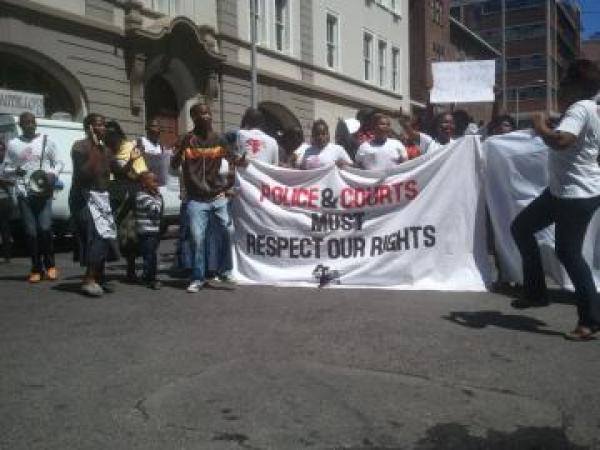The People versus the Minister of Police

Yesterday, the Constitutional Court dismissed a request by the Minister of Police Nathi Mthethwa and others to hear a direct appeal against the appointment of the O’Regan/Pikoli Commission of Inquiry.
Western Cape Premier Helen Zille appointed the O’Regan/Pikoli Commission to investigate allegations of inefficiency at police stations in Khayelitsha and a breakdown in relations between the Khayelitsha community and members of the Police Service. The court effectively found that the Minister had no valid reasons to appeal and ordered the government to pay the legal costs of the Social Justice Coalition (SJC).
Minister Mthethwa’s lawyers argued that Zille did not have the constitutional right to appoint the commission, that she had done so without meeting her obligations in terms of cooperative governance, and that the terms of the commission were “vague and overbroad”.
A unanimous verdict written by Deputy Chief Justice Moseneke on behalf of the Constitutional Court rejected each of these arguments as “without merit”. The court criticised the minister of police for not engaging with the premier more closely, referring to nine months of “extensive correspondence” between the premier and the provincial commissioner of police, which had occurred with full knowledge of the national commissioner and the minister. They also pointed out that the minister waited until the last minute to seek a remedy, relying on the courts to referee their disagreement without first declaring a dispute, engaging with the premier, or responding directly to the community’s complaints.
The court also expressed concern about the minister’s decision to resort to expensive legal measures rather than engaging with the province or the community. Whereas both the provincial and the national governments’ legal costs are “ultimately sourced from the same public purse”, the only group who need to pay for their own legal representation are the communities.
Justice Moseneke wrote in the judgment, when awarding costs to the SJC: “The Social Justice Coalition is a civil society organisation acting in the public interest. It was one of the parties which lodged the complaints with the Premier. The complaints led to the appointment of the Commission and later to this dispute. It is now undisputed that the nature and scope of the complaints justified the appointment of the Commission. The correspondence between the Minister, Commissioner and Premier, as well as the report of the Police Service task team, show that the complaints are not frivolous and deserve to be tackled. The Social Justice Coalition should not be out of pocket for raising a matter of importance in favour of vulnerable people who are victims of pervasive crime.”
Regarding the minister’s claim that the premier did not have the constitutional authority to appoint the commission, the court found that “the competence to appoint a provincial commission of inquiry into police inefficiency and its alleged dysfunctional relations with any community is part of a constitutionally-mandated scheme through which provinces are entitled to monitor and oversee the police function within their area of remit”.
The Constitution recognises that, although the ultimate responsibility for the police belongs to the minister, provincial authorities such as the office of the premier share responsibility for effective, efficient and visible policing. Even though the province does not have direct control over the policing function, it “has a legitimate interest that its residents are shielded from crime”. Additionally, the provincial commissioner is accountable to the provincial legislature for the state of policing in the province.
As a result, the court also found that it was essential to give the O’Regan–Pikoli commission the right to issue subpoenas, otherwise it would not have the coercive powers required to compel members of the public or government officials to appear before the commission or to compel government bodies and others to provide copies of relevant documents. In the words of Justice Moseneke, “a commission without coercive powers would indeed be unable to fulfil its mandate”.
Although the terms of the commission are narrow, the community’s complaint to Premier Zille raises a wide range of issues. This includes “insufficient visible policing in the community, lack of witness protection, lack of co-ordination between the police and prosecuting services, and poor treatment of victims of crimes” as well as “the routine violation of the rights of the residents of Khayelitsha” and “the impact of high crime rates on residents including children and people vulnerable to discrimination”.
Crime is a complex problem that requires a comprehensive, carefully planned, and well-informed fact-based responses by a wide range of community members, organisations, academics, and community organisations. The O’Regan–Pikoli Commission of Inquiry is only the next step in a campaign for safety and security that has been going on for at least 10 years, and seems set to continue for many more. But it is a crucial step in engaging the communities who are most vulnerable to violent crime, gender-based violence, and other forms of criminal harm.
Support independent journalism
Donate using Payfast

Don't miss out on the latest news
We respect your privacy, and promise we won't spam you.

This article is licensed under a Creative Commons Attribution-NoDerivatives 4.0 International License.
